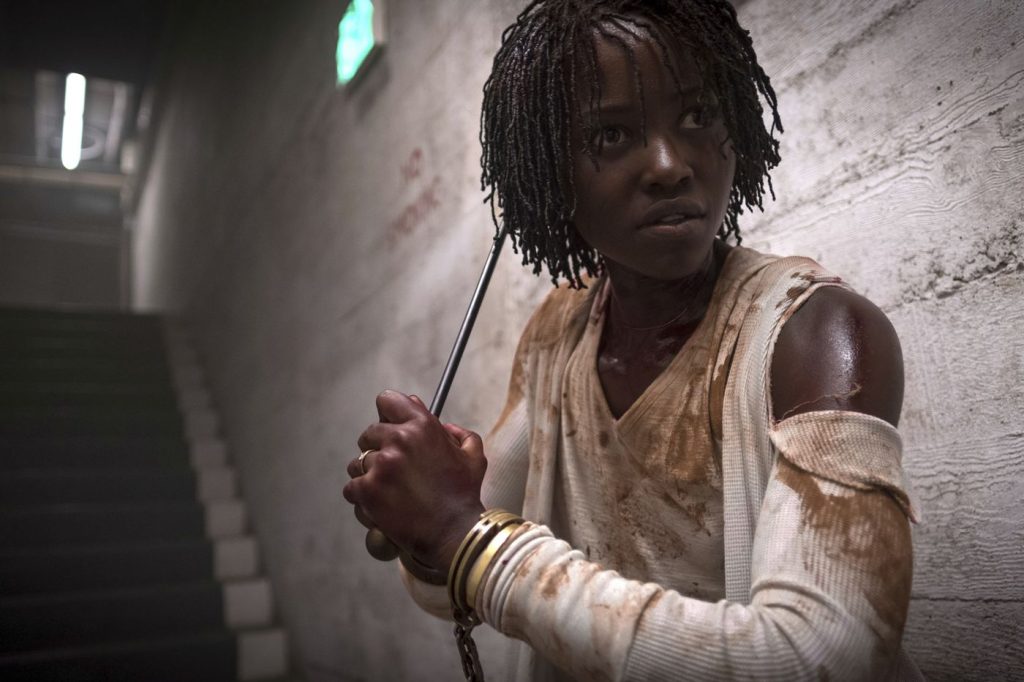“Us” | Film Review


Us marks writer and director Jordan Peele’s second big screen outing following his highly acclaimed 2017 debut, Get Out. Much as in that film, Peele utilizes horror cinema to relay a provocative and compelling morality tale in Us, tapping into an unsettling zeitgeist. Where Get Out concentrated on race relations and fetishistic body commodification, Us proffers a disturbing and ambitious treatise on class.
Like many of his horror/suspense contemporaries—David Robert Mitchell (It Follows), Jennifer Kent (The Babadook), Robert Eggers (The Witch), Jeremy Saulnier (Green Room) and Ari Aster (Hereditary)—Peele (armed with a wellspring of creativity, imagination and an encyclopedic knowledge of the horror films that informed his youth) pushes the boundaries of the genre, offering disturbing insights on the existential dread lurking just beneath society’s seemingly placid mores.
That intention is clear from the title card, as Us opens enumerating the many abandoned and unused tunnels hidden beneath the American landscape. This is one of many seeds Peele plants throughout Us (including caged white rabbits, Jeremiah 11:11, Hand Across America, etc.), not only in anticipation of the movie’s conclusions but also for inevitable (and rewarding) repeat viewings of the film.
In light of Peele’s vocabulary in the genre, Us locks into a familiar horror setup en route to something new. Adelaide Wilson (Lupita Nyong’o, in a brilliant, star-making turn) begrudgingly agrees to accompany her husband Gabe (Winston Duke), daughter Zora (Shahadi Wright Joseph) and son Jason (Evan Alex) on a Santa Cruz beach vacation. Haunted by a traumatic childhood experience in a hall of mirrors at that same beach, Adelaide soon finds the visit plagued by strange and off-putting events. The family’s first night at their coastal house, Adelaide grows increasingly concerned that something bad will soon happen to her family if they stay. Despite Gabe’s best efforts at relieving the tension for his family and the audience, alike, the house is soon besieged by a quartet of warped Wilson family doppelgängers clad in matching red jumpsuits, their leader wielding golden scissors gripped tightly in the tan driving glove of her left hand.
Herein lies the one of most the impressive aspect of Us. Four gifted and nuanced actors play both the tight-knit Wilson family as well as their evil counterparts: the wheezing, wide-eyed Red (Nyong’o), the grunting brute Abraham (Duke), the homicidal, rictus-grinned Umbrae (Wright Joseph), and the barking, masked pyromaniac Pluto (Alex).
Drawing from horror inspirations as varied as Michael Haneke’s Funny Games (1997 and 2007), Tod Browning’s Freaks (1932), Kim Jee-woon’s A Tale of Two Sisters (2004), as well as the television show The Twilight Zone (of which Peele is helming a new iteration next month), Us is tapped into not only the politically polarized climate of our nation but also the increasing division between the upper- and the under-classes. When Gabe asks Adelaide’s doppelgänger, Red, “Who are you people?” she answers back frankly, “We’re Americans.” It wouldn’t be a longshot to surmise that the “Us” of Peele’s film may also stand for the “United States.”
While the film’s third act is hampered by exposition, Us is a cinematic experience that will linger with the viewer long after the final credits roll. Owing to Peele’s mastery of storytelling, each and every plot point and narrative device has some sort of satisfying pay-off. And the film’s latter half invites speculation in such a way that you can sense Peele trusting his audience’s ability to fill in the story’s more ambiguous aspects. Given the now-twice acclaimed auteur’s profound insight and imagination, sharing the floor with the viewer has to be one of Peele’s most admirable and underappreciated qualities.
-Anthony King



